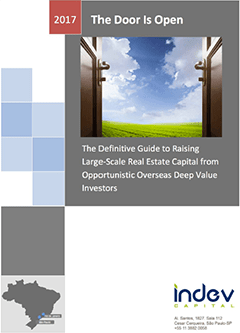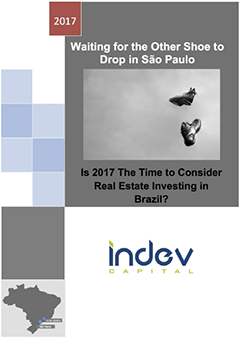Where is the Beef? Where is the Money?
(please click in the image to see the full video)
The Top Ten Reasons Emerging Market Real Estate Asset Managers Cannot Access Large-Scale Global Capital
InDev Capital provides large-scale global investors with turnkey (ready to execute) deep-value real estate investment opportunities. We have close contact and are in constant communication with a select group of large macro investors that have interest in deep-value real estate investment strategies. These investors have very strong interest in Brazil currently.
What is “deep-value real estate” investing? Think of it as buying a dollar for fifty cents. It is an investment orientation that focuses on the following: one, protection of principal; two, purchasing assets with a significant margin of safety; three, the ability to achieve significant returns; four, purchasing assets below replacement costs; and five, purchasing assets below fair market value in an orderly sale process.
Our firm is very heavily involved in some specific large-scale investment opportunities in Brazil currently; however, even these large-scale transactions that we are currently working on do not fully meet our investor contacts’ demand to invest in Brazil at this time in the cycle. Why?
This newsletter is to provide a Guideline and Perspective of what is holding this large-scale opportunistic capital back and how, if you move fast, perhaps you can take advantage of this unique window in Brazil’s real estate cycle.
Reason Number 10 – Return Expectations

Money is global and goes to the place with the highest risk-adjusted return. Risk-adjusted return is the key term. No large-scale opportunistic investor is entering Brazil to achieve an unlevered nominal return that is not at least 20% IRR. Why? That investment is competing with all the other investment opportunities in the world, Europe, USA, Australia, Argentina, etc. and in currencies with significantly greater stability.
Currently, hedging, a necessary action to convert Brazilian real returns to USD returns, lowers Brazil nominal IRR returns by 600 bps to 800 bps per year according to large-scale investor estimates. For value-added acquisition strategies, the returns unlevered need to be 20% to 25%++. This creates a dollar unlevered return post hedging well north of 10%. which is the absolute minimum for investors currently interested in Brazil.
A 15% to 19% unlevered nominal return transaction in Brazil has very little interest from large-scale investors currently.
Reason Number 9 – IRR vs. Total Profits
In Brazil, debt is used to lower the equity need. However, given the high cost of debt at this time it is often not net accretive on a real basis (the leverage cost is often higher than the actual yield). For example, on many BTS transactions the objective is to lever the transaction as much as possible to achieve the highest IRR and lower the capital needed. Correspondingly, the equity size is very small and the potential profits are very small (even with a large IRR). There is very little interest from opportunistic investors in opportunities that do not generate at least US$15M to US$20M in profits. Leverage actually lowers this actual profit number.
Reason Number 8 – Investment Thesis Match

Tough to play ball with two left feet….
Changing large-scale opportunistic investor behavior is difficult if not impossible. For example, a Brazilian real estate asset manager may believe that now is the right time to buy raw land pre-approval or residential units in mid construction and generate an investment opportunity based on that strategy. This actually could be very accurate and the right strategy.
However, most opportunistic investors looking at Brazil now are focused on the forward yield curve (current income-producing assets) and how a potential tightening capitalization rate can create substantial value. Hence, before even talking about a transaction with an investor, if a sponsor pursues a strategy whose investment thesis the investor has not bought into, there is a fundamental disagreement before the conversation even starts.
Reason Number 7 – Push vs. Pull
These guys are motivated… easier to sell in the direction that they are committed to.
The usual method an emerging market real estate asset manager would use to start looking for capital would be to find a great deal and then go find money. Basically, this is a push strategy. If the asset manager is lucky, the asset he has found matches the investment thesis of a large-scale global investor. Great! If not, the real estate asset manager will start to “push” this transaction onto an investor, usually with a nice PowerPoint (we will cover PowerPoint fundraising in another newsletter soon to come). Once an asset manager starts this approach of pushing a deal, there is a tendency to “double down” and ignore investor feedback and keep pitching “the idea.”
A pull strategy, finding opportunities that investors seek, requires a deeper investor relationship, humility, and time, or a strategic partner that is already in constant touch with these investors. Open dialogue about what is of interest to an investor is where all strategies need to start. Importantly, a pull strategy can result in investor interest in looking at deals with the asset manager. That is when things truly get exciting.
Reason Number 6 – Lack of Proprietary Deal Flow
 This is not the desired purchase strategy.
This is not the desired purchase strategy.
Deep-value investors tend to avoid competitive auctions. Why? Because a significant part of the value creation of this deep value investor is an actual mispricing. An auction by its very nature tends to reduce this mispricing opportunity. Hence, without proprietary deal flow there is little chance to achieve a price that justifies global investors’ return expectations. Showing a pipeline to an opportunistic investor where each asset is a competitive auction is largely a waste of time.
Reason Number 5 – “There are No Comparable Transactions” – “Believe Me” – “Voodoo” and Other Forms of Mysticism and Magic
This is not a good strategy to convince an investor of the value of an asset….
Often Brazilian investors and family offices, due to their local knowledge, will not ask for comparable transactions to determine the value of an asset. Comparable transactions are actual transactions that occurred in the last two years with similar quality asset types and in similar regions. This provides a factual basis for comparison. Deep-value investors do not want opinions of value but actual proof. Proof is defined as money moving from an investor’s pocket to a seller’s pocket to purchase a similar asset in a relatively recent timeframe (2 years).
Therefore, when a large-scale investor asks for comparable transactions, a Brazilian asset manager will assert that it is difficult to find but that they “believe” that X is the market price. This is the definition of mysticism and Voodoo to an opportunistic investor.
This type of response will not attract capital from large-scale opportunistic investors. Global investors understand that information quality in Brazil is not at the level of NYC or London. However, to provide no comparable transactions and expect a “belief system” or “feeling” to convince an overseas investor is not too different from telling the investor that a fortune teller in Centro Sao Paulo told you the value of the asset. Opinions are worthless. All that matters is facts to prove value, that is comparable transactions.
Reason Number 4 – Pipeline and Scale – Is it worth the Investor’s Time
 While each deal does not need to be US$50M to US$100M, the investment opportunity needs to have this type of scale. For example, if a real estate asset manager is in discussion with three assets that are each US$15M dollars and the assets are not professionally auctioned, this is a conversation. Trying to find foreign capital for less than US$15M is not a productive use of time for all parties involved.
While each deal does not need to be US$50M to US$100M, the investment opportunity needs to have this type of scale. For example, if a real estate asset manager is in discussion with three assets that are each US$15M dollars and the assets are not professionally auctioned, this is a conversation. Trying to find foreign capital for less than US$15M is not a productive use of time for all parties involved.
Reason Number 3 – Skin in the Game – Local Sponsor Capital Missing in Action
 A large-scale opportunistic investor will require control well over 50%; however, very few successful large-scale investors have become successful investing in transactions far from NYC, Boston, Los Angeles, or London without some local sponsor capital showing alignment and proof of concept. A 10% commitment of capital will provide proof of alignment and keep investors interested. Investors are not as concerned that all of the capital comes directly from the sponsor’s pocket, but the investor does need to see a significant commitment from local capital.
A large-scale opportunistic investor will require control well over 50%; however, very few successful large-scale investors have become successful investing in transactions far from NYC, Boston, Los Angeles, or London without some local sponsor capital showing alignment and proof of concept. A 10% commitment of capital will provide proof of alignment and keep investors interested. Investors are not as concerned that all of the capital comes directly from the sponsor’s pocket, but the investor does need to see a significant commitment from local capital.
Reason Number 2 – No Direct Experience In Target Sector
 Often a real estate manager or developer will have deep experience in one sector, perhaps residential but then decide to build a strategy in another sector, perhaps logistics. Although everything works on paper, this lack of direct experience in the sector, particularly if a new partner with that direct experience is not immediately recruited, will often cause problems in due diligence, the bid strategy, or the ability to source proprietary transactions. If a sponsor wants to change strategies, it is best to bring in a partner or an executive with significant experience in the target sector. No one wants to invest capital of scale for someone to try a new sector.
Often a real estate manager or developer will have deep experience in one sector, perhaps residential but then decide to build a strategy in another sector, perhaps logistics. Although everything works on paper, this lack of direct experience in the sector, particularly if a new partner with that direct experience is not immediately recruited, will often cause problems in due diligence, the bid strategy, or the ability to source proprietary transactions. If a sponsor wants to change strategies, it is best to bring in a partner or an executive with significant experience in the target sector. No one wants to invest capital of scale for someone to try a new sector.
Reason Number 1 – Process and Procedures – Work Style Method

A large-scale global investor has processes and procedures. During the investment process and due diligence, the local sponsor is actually demonstrating its capability to execute. Sourcing a good deal is only the beginning. It has been our experience that the best sponsors have some type of internal task management system before engaging foreign capital. If the sponsor does not have this type of system, it is highly recommended to either start using one or, in InDev Capital’s case, we can create a system to track all of the tasks because dropping the ball after having investor interest can change the investor’s perception of the management team and make it more difficult to close a transaction.
InDev Capital would love to hear your opinion of this list. Please email my business partner, who is a much nicer person, smarter, better looking, and has substantially more hair than I do. He can be reached at ricardo.carvalho@indevcapital.com. If you think you can avoid all of these issues and have a proprietary transaction ready to go, please email immediately. If you have one or two items that you are struggling with, our firm can potentially help.
If this is of interest, we would welcome the opportunity to get “on the box” (US lingo for telephone) and have a chat about what you are up to and see if a meeting makes sense.
From the Streets of Vila Madalena,

Joseph W. Williams
CEO & Founder InDev Capital





